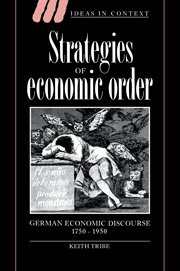Book contents
- Frontmatter
- Contents
- Acknowledgements
- 1 Introduction: From Cameralism to Ordoliberalism
- 2 Cameralism and the science of government
- 3 Die Vernunft des List. National economy and the critique of cosmopolitan economy
- 4 Historical Economics, the Methodenstreit, and the economics of Max Weber
- 5 The Handelshochschulen and the formation of Betriebswirtschaftslehre, 1898–1925
- 6 The Logical Structure of the Economic World – the rationalist economics of Otto Neurath
- 7 Capitalism, totalitarianism and the legal order of National Socialism
- 8 The genealogy of the Social Market Economy: 1937–48
- 9 The New Economic Order and European economic integration
- Bibliography
- Index
- Ideas in Context
3 - Die Vernunft des List. National economy and the critique of cosmopolitan economy
Published online by Cambridge University Press: 14 September 2009
- Frontmatter
- Contents
- Acknowledgements
- 1 Introduction: From Cameralism to Ordoliberalism
- 2 Cameralism and the science of government
- 3 Die Vernunft des List. National economy and the critique of cosmopolitan economy
- 4 Historical Economics, the Methodenstreit, and the economics of Max Weber
- 5 The Handelshochschulen and the formation of Betriebswirtschaftslehre, 1898–1925
- 6 The Logical Structure of the Economic World – the rationalist economics of Otto Neurath
- 7 Capitalism, totalitarianism and the legal order of National Socialism
- 8 The genealogy of the Social Market Economy: 1937–48
- 9 The New Economic Order and European economic integration
- Bibliography
- Index
- Ideas in Context
Summary
His object is to transplant economic theory (Staatswirtschaftslehre) from the lecture hall to the office, and in this he succeeds admirably. Such a book, making the most important parts of economics common property and illuminating austere thought processes with striking illustrations in a readable, conversational style, cannot fail also in Germany to find a larger public.
So wrote Friedrich List to the publisher J.G. Cotta in 1822, offering to translate Louis Say's Considerations sur l'industrie et la législation, a book which presented a series of readable summaries of recent economic treatises. Nothing came of this particular proposal to translate Say; but the project of rendering economic principles accessible to a wider popular audience was one which List later made his own. Unlike Louis Say, however, he eschewed straightforward summary of the principles advanced by contemporary economic writers. Instead, he developed a systematic critique of economic orthodoxies, a critique that turned on his contention that the intellectual legacy of Adam Smith was marked by an artificial divorce of politics from economics. As a consequence, he suggested, political distinctions and national interests failed to find a place in a doctrinal system that assumed a world ruled by general, universally valid economic laws. The ‘School’, as he dubbed the heirs of Adam Smith, therefore practised a Cosmopolitical Economy, rather than a true Political Economy which recognised the exigencies of national interests and political forces.
- Type
- Chapter
- Information
- Strategies of Economic OrderGerman Economic Discourse, 1750–1950, pp. 32 - 65Publisher: Cambridge University PressPrint publication year: 1995
- 1
- Cited by



